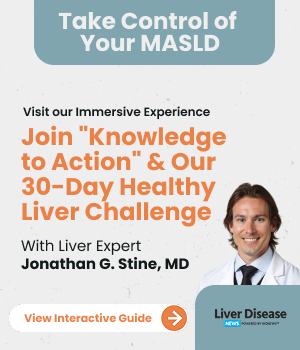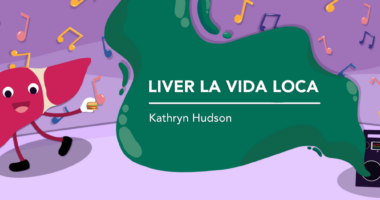Potential THR-beta agonist may more safely, effectively treat MASH
Phase 2a trial of oral ALG-055009 finds an up to 46.2% reduction in liver fat

Once daily treatment with oral ALG-055009 safely lowered levels of liver fat in people with metabolic dysfunction-associated steatohepatitis (MASH), a severe form of fatty liver disease, and mild to severe liver scarring (fibrosis), the treatment’s developer, Aligos Therapeutics, reported.
Top-line results from the Phase 2a HERALD clinical trial (NCT06342947) showed that the three higher doses tested resulted in significantly greater reductions in liver fat, by up to 46.2%, relative to a placebo.
ALG-055009 is a thyroid hormone receptor-beta (THR-beta) activator, or agonist — a class of medications that includes Rezdiffra (resmetirom), which earlier this year became the first MASH therapy approved in the U.S.
“When designing ALG-055009, our goal was to create a potential best-in-class [THR-beta] agonist through enhanced potency and a superior [pharmacological] profile,” Lawrence Blatt, PhD, chairman, president, and CEO at Aligos, said in a company press release.
Phase 2b trial of ALG-055009 in MASH patients being planned
“Today’s data demonstrates that these enhanced pharmacologic properties did indeed translate into robust improvements in liver fat reduction,” Blatt said, adding that the therapy’s favorable safety profile “is important given that MASH medications will likely be administered for prolonged periods of time.”
Aligos plans to detail trial results at a scientific meeting later this year, and it expects to complete work supporting the launch of a Phase 2b trial of ALG-055009 in MASH patients by mid-2025, Blatt said. The company also is looking at options, including potential partners, to support ALG-055009’s further development.
THR-beta agonists are designed to activate the THR-beta protein, whose dysfunction is associated with fibrosis and disease progression in MASH, marked by fat deposits in the liver that give rise to damaging inflammation and scarring.
By activating this protein, THR-beta agonists are expected to help in reversing MASH severity and easing fibrosis, in addition to lowering levels of fats such as cholesterol in the bloodstream to benefit overall cardiovascular health.
ALG-055009 is designed to be more potent and selective than other THR-beta agonists, Aligos states on a company webpage. It’s also intended to have more favorable pharmacokinetics, which refers to the way a molecule moves into, through, and out of the body.
Data from Phase 1 studies in healthy volunteers demonstrated that single and multiple daily doses of ALG-055009 were well tolerated with good pharmacological properties. Multiple dosing also associated with dose-dependent reductions in blood levels of fatty molecules.
Reductions with treatment seen in liver fat, blood levels of fatty molecules
The Phase 2a HERALD study evaluated whether the experimental therapy was safe and worked as intended in adults with presumed MASH and mild, moderate, or severe liver fibrosis.
A total of 102 participants were randomly assigned to one of four ascending doses of ALG-055009 (0.3, 0.5, 0.7, or 0.9 mg) or to a placebo, given as a softgel capsule once daily for 12 weeks (about three months).
Results indicate that ALG-055009 at its three highest doses led to statistically significant reductions in liver fat, measured via a specialized type of MRI, after 12 weeks of treatment relative to a placebo, meeting the study’s main goal.
A dose-dependent reduction in liver fat of up to 46.2% was reported with ALG-055009 relative to a placebo. That finding is favorable relative to data from Rezdiffra clinical trials, where liver fat was reduced by 26% compared with placebo in a Phase 2 trial, according to Aligos.
Moreover, up to 70% of participants given ALG-055009 at any dose level achieved at least a 30% relative reduction in liver fat after 12 weeks of treatment.
Best results were reported in patients treated at the 0.7 mg daily dose.
ALG-055009 also associated with significant reductions in blood levels of fatty molecules involved in the formation of plaques in blood vessels, and with an increase in sex hormone binding globulin, a marker of THR-beta activation in the liver.
Potential for lower gastrointestinal side effects, including diarrhea
“The robust improvements in liver fat and other clinically relevant biomarkers … demonstrate why potency and [pharmacokinetics] are pertinent when designing molecules aimed at improving patient outcomes,” said Rohit Loomba, MD, the trial’s principal investigator at the University of California San Diego. “This has been an exciting year for the MASH space, which continues with this excellent data from Aligos’ ALG-055009, which has the potential for not only improvement in resolution of MASH, but also fibrosis [reduction].”
The treatment was generally well tolerated, with no serious adverse events or need for dose reductions reported. The rate of gastrointestinal problems, which are a common side effect of Rezdiffra, was similar between ALG-055009 and placebo groups, and the frequency of diarrhea was lower among adults randomized to ALG-055009.
This favorable safety profile “has the potential to help patients better adhere to MASH treatment,” Blatt said.








